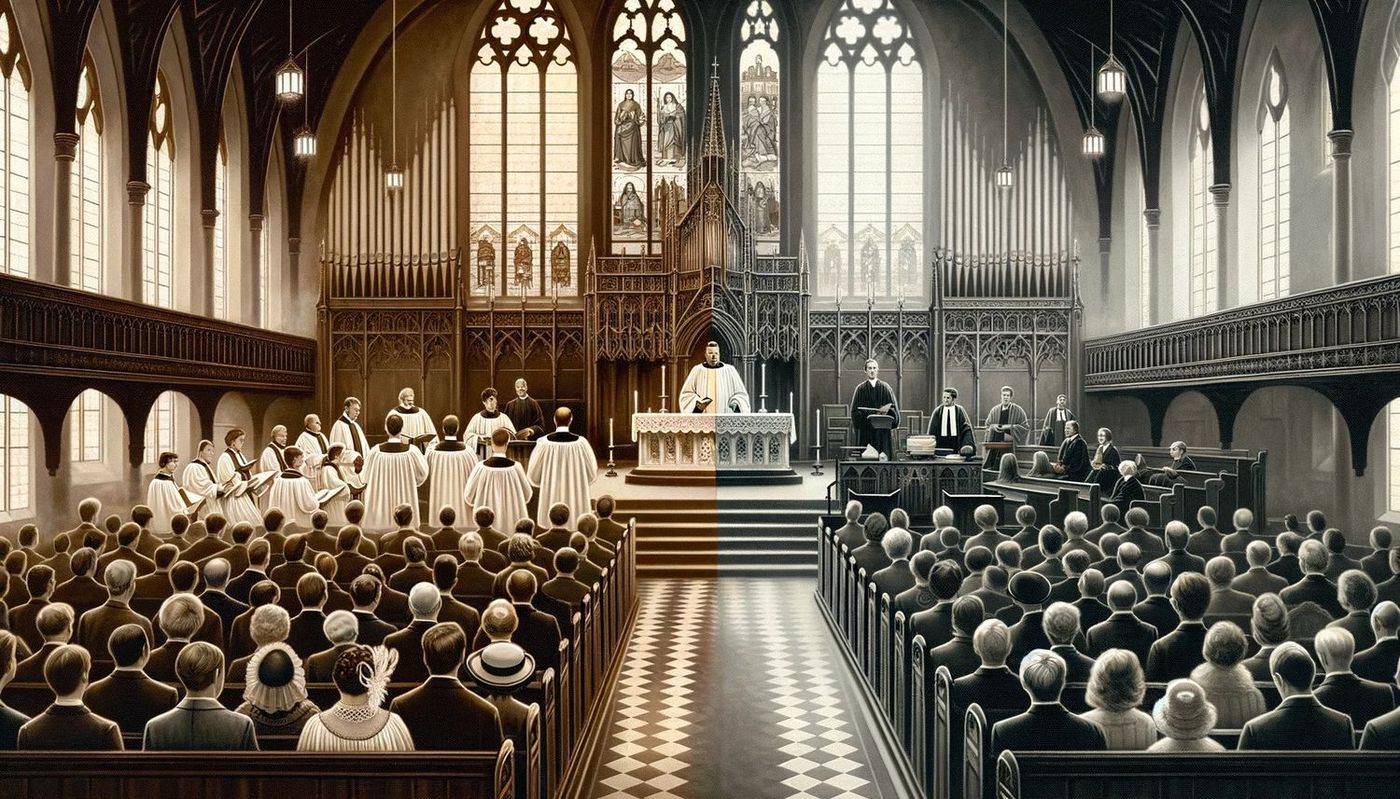Home>Theology and Spirituality>What Are The Big Difference Between Seventh Day Adventist And Baptist


Theology and Spirituality
What Are The Big Difference Between Seventh Day Adventist And Baptist
Published: February 21, 2024
Jason DeRose, Managing Editor at Christian.net, uses his expertise in religion and journalism to deepen understanding of faith's societal impacts. His editorial leadership, coupled with a strong academic background, enriches the platform’s diverse content, earning him recognition in both journalism and religious circles.
Discover the key differences in theology and spirituality between Seventh Day Adventist and Baptist denominations. Explore their distinct beliefs and practices.
(Many of the links in this article redirect to a specific reviewed product. Your purchase of these products through affiliate links helps to generate commission for Christian.net, at no extra cost. Learn more)
Table of Contents
Introduction
The Seventh-day Adventist Church and the Baptist Church are two prominent Christian denominations with distinct beliefs, practices, and traditions. While both share a foundation in the Christian faith, they differ in several key areas, including their interpretations of scripture, views on salvation, and approaches to worship. Understanding the differences between these two denominations can provide valuable insights into the diverse tapestry of Christian belief and practice.
The Seventh-day Adventist Church, founded in the 19th century, emphasizes the observance of the Sabbath on the seventh day of the week, in accordance with the Ten Commandments. This emphasis on the Sabbath sets them apart from many other Christian denominations, including the Baptist Church, which typically observes the Sabbath on Sunday. Additionally, Seventh-day Adventists place a strong emphasis on health and wellness, advocating for a vegetarian diet and abstaining from alcohol and tobacco.
On the other hand, the Baptist Church, with its roots in the Protestant Reformation, places a strong emphasis on the autonomy of the local church and the believer's baptism by immersion. Baptists believe in the priesthood of all believers and emphasize the authority of scripture in matters of faith and practice. This contrasts with the Seventh-day Adventist belief in the investigative judgment, a unique doctrine that sets them apart from many other Christian denominations.
As we delve deeper into the beliefs, practices, and traditions of these two denominations, it becomes evident that while they both profess a commitment to following Christ, their interpretations of scripture and theological emphases lead to distinct expressions of the Christian faith. In the following sections, we will explore these differences in greater detail, shedding light on the unique characteristics of the Seventh-day Adventist and Baptist Churches.
Beliefs and Doctrines
Seventh-day Adventist Church
- Sabbath Observance: One of the defining beliefs of the Seventh-day Adventist Church is the observance of the Sabbath on the seventh day of the week, which is Saturday. This practice is rooted in the Ten Commandments and is seen as a sign of loyalty to God as the Creator.
- Investigative Judgment: Another distinctive doctrine is the belief in the investigative judgment, a process in which the heavenly records are examined to determine the character and faithfulness of each person. This teaching sets Seventh-day Adventists apart from many other Christian denominations.
- Health and Wellness: The Seventh-day Adventist Church places a strong emphasis on health and wellness, advocating for a vegetarian diet, abstinence from alcohol and tobacco, and promoting a holistic approach to well-being.
Baptist Church
- Believer's Baptism: Baptists emphasize the believer's baptism by immersion, viewing it as an outward expression of one's faith and a symbol of the believer's union with Christ in His death, burial, and resurrection.
- Autonomy of the Local Church: The Baptist Church upholds the autonomy of the local church, meaning that each individual congregation has the freedom to govern its own affairs without external control or influence from a higher authority.
- Priesthood of All Believers: Baptists affirm the priesthood of all believers, emphasizing the direct access that every Christian has to God through Jesus Christ without the need for an intermediary.
Both denominations share core Christian beliefs such as the Trinity, the divinity of Jesus Christ, the authority of the Bible, and the importance of prayer. However, their distinct doctrinal emphases and interpretations of scripture give rise to unique theological perspectives and practices. Understanding these differences can foster a deeper appreciation for the rich tapestry of Christian faith and the diverse ways in which it is expressed within different denominational traditions.
Worship and Practices
Seventh-day Adventist Church
Seventh-day Adventist worship and practices are deeply rooted in their distinctive beliefs and doctrines. The observance of the Sabbath on Saturday is a central aspect of their worship. The Sabbath is a time for spiritual reflection, rest, and communal worship, providing a sacred space for Seventh-day Adventists to connect with God and fellow believers. The order of worship often includes traditional hymns, scripture readings, and sermons that emphasize the importance of the Sabbath as a day of rest and spiritual rejuvenation.
In addition to their observance of the Sabbath, Seventh-day Adventists place a strong emphasis on health and wellness. Many Seventh-day Adventists adhere to a vegetarian diet and abstain from alcohol and tobacco, viewing the body as a temple of the Holy Spirit. This holistic approach to health is often reflected in their worship practices, with an emphasis on promoting physical, mental, and spiritual well-being.
Baptist Church
In contrast, the worship and practices of the Baptist Church are characterized by a focus on congregational singing, fervent prayer, and expository preaching. Music plays a significant role in Baptist worship, with congregational hymn singing being a cherished tradition. The Baptist worship service often includes a blend of traditional hymns and contemporary worship songs, providing a rich musical tapestry that engages the congregation in heartfelt praise and adoration.
Baptists also place a strong emphasis on the preaching of God's Word. The sermon is a central component of the worship service, with a focus on expository preaching that delves deeply into the biblical text. The aim is to expound upon the scriptures, provide practical application for daily living, and challenge believers to grow in their faith and discipleship.
Common Ground
While there are distinct differences in worship and practices between the Seventh-day Adventist Church and the Baptist Church, both denominations share a commitment to fostering a sense of community and spiritual growth within their congregations. The worship services serve as a time for believers to come together, express their faith through music and prayer, and engage with the teachings of scripture. Despite their theological variances, both denominations seek to create a space for believers to encounter God, deepen their understanding of the Christian faith, and find encouragement within the community of believers.
Understanding the unique worship and practices of each denomination provides valuable insights into the diverse ways in which Christians express their faith and devotion. These differences contribute to the rich tapestry of Christian worship traditions, reflecting the beauty of unity within diversity across various denominational expressions of the Christian faith.
Leadership and Organization
Seventh-day Adventist Church
The leadership and organizational structure of the Seventh-day Adventist Church is characterized by a hierarchical system that extends from the local congregation to the global level. At the local level, each church is led by a pastor who provides spiritual guidance and oversight to the congregation. The pastor is supported by a team of elders and deacons who assist in various aspects of church ministry and administration.
Moving beyond the local congregation, Seventh-day Adventist churches are organized into conferences, which are regional administrative units responsible for overseeing multiple congregations within a specific geographic area. These conferences provide support, resources, and leadership to the local churches under their jurisdiction. At the next level, unions oversee a group of conferences within a larger geographic region, providing coordination and support for the work of the church within their respective territories.
The highest level of organizational authority within the Seventh-day Adventist Church is the General Conference, which serves as the global administrative body responsible for guiding the overall mission and direction of the denomination. The General Conference coordinates the work of the church on an international scale, facilitating collaboration and unity among Seventh-day Adventist congregations worldwide.
Baptist Church
In contrast to the hierarchical structure of the Seventh-day Adventist Church, the Baptist Church is characterized by its emphasis on the autonomy of the local congregation. Each Baptist church operates independently and is self-governing, with the congregation making decisions regarding matters such as leadership appointments, budgeting, and ministry initiatives.
Leadership within a Baptist church typically includes a pastor, deacons, and various ministry leaders who work together to provide spiritual guidance, pastoral care, and administrative oversight. The pastor plays a central role in preaching, teaching, and shepherding the congregation, while the deacons often assist in practical matters related to the church's operations and ministry outreach.
While Baptist churches may choose to associate with regional or national Baptist associations for fellowship, support, and cooperative initiatives, these associations do not exercise authority over the individual congregations. This emphasis on congregational autonomy reflects the Baptist belief in the priesthood of all believers and the freedom of each local church to govern its own affairs without external interference.
Contrasting Approaches
The contrasting approaches to leadership and organization between the Seventh-day Adventist Church and the Baptist Church reflect their respective theological emphases and historical developments. While the Seventh-day Adventist Church prioritizes a centralized administrative structure to facilitate global mission and coordination, the Baptist Church values the independence and self-governance of local congregations, emphasizing the direct authority of the congregation in matters of church governance.
Understanding these differences in leadership and organization provides valuable insights into the diverse ways in which Christian denominations structure their administrative processes and cultivate leadership within their faith communities. These distinct approaches contribute to the rich tapestry of Christian traditions, reflecting the varied expressions of church governance and leadership models across different denominational contexts.
Views on Salvation and Grace
Seventh-day Adventist Church
The Seventh-day Adventist Church holds a distinctive perspective on salvation and grace that is shaped by its unique doctrinal teachings. Central to Seventh-day Adventist theology is the belief in the investigative judgment, a process in which the lives of professed believers are examined to determine their fitness for salvation. This investigative judgment, based on the book of Daniel and the biblical imagery of the heavenly sanctuary, is seen as a pre-advent judgment that commenced in 1844. It is believed to be a time of reckoning and purification, during which the character and faithfulness of individuals are scrutinized.
In terms of grace, Seventh-day Adventists affirm the essential role of God's grace in the process of salvation. They emphasize the transformative power of God's grace to enable believers to live a life of obedience and holiness. While salvation is viewed as a gift from God, Seventh-day Adventists also emphasize the importance of cooperating with God's grace through faithful obedience to His commandments. This emphasis on obedience as a response to God's grace reflects the Seventh-day Adventist belief in the enduring significance of the Ten Commandments, including the observance of the Sabbath as a sign of loyalty to God.
Baptist Church
In contrast, the Baptist Church holds a distinct perspective on salvation and grace that is rooted in the principles of faith and the sovereignty of God. Baptists emphasize the doctrine of justification by faith, affirming that salvation is a gift of God's grace received through faith in Jesus Christ. They believe that salvation is a result of God's unmerited favor and is not contingent upon human works or efforts. This emphasis on grace as the sole basis of salvation reflects the Baptist commitment to the sufficiency of Christ's atoning work on the cross.
Baptists also uphold the doctrine of eternal security, commonly referred to as "once saved, always saved," which asserts that those who have genuinely trusted in Christ for salvation cannot lose their salvation. This assurance of eternal security is grounded in the belief that God's grace is sufficient to secure the believer's salvation for eternity, independent of their performance or obedience.
Contrasting Perspectives
The contrasting perspectives on salvation and grace between the Seventh-day Adventist Church and the Baptist Church reflect their distinct theological emphases and interpretations of scripture. While Seventh-day Adventists emphasize the role of obedience and the investigative judgment in the process of salvation, Baptists underscore the primacy of God's grace and the assurance of eternal security for believers. These differing perspectives contribute to the rich diversity of Christian thought and theology, highlighting the multifaceted ways in which believers understand and experience the grace of God in their lives.
Views on End Times and Eschatology
Seventh-day Adventist Church
The Seventh-day Adventist Church holds a distinctive perspective on end times and eschatology, which is deeply rooted in the teachings of the Bible and the writings of Ellen G. White, a co-founder of the denomination. Central to Seventh-day Adventist eschatology is the belief in the imminent return of Jesus Christ, known as the Second Coming. This event is seen as the culmination of human history and the fulfillment of God's redemptive plan for the world. Seventh-day Adventists emphasize the importance of being prepared for Christ's return and living in anticipation of the eschatological events foretold in scripture.
In addition to the belief in the Second Coming, Seventh-day Adventists hold distinctive views on end-time prophecies, including the interpretation of Daniel and Revelation. They believe in the prophetic significance of the 2300-day prophecy in the book of Daniel, which they interpret as pointing to the investigative judgment and the cleansing of the heavenly sanctuary. This unique understanding of end-time prophecy shapes Seventh-day Adventist eschatology and underscores the urgency of proclaiming the three angels' messages as outlined in the book of Revelation.
Furthermore, Seventh-day Adventists emphasize the concept of the remnant church, viewing themselves as a prophetic community called to proclaim the everlasting gospel in the context of end-time events. This understanding of the remnant church as a faithful and obedient people who uphold the commandments of God and possess the testimony of Jesus Christ informs their eschatological identity and mission in the world.
Baptist Church
In contrast, the Baptist Church approaches end times and eschatology with a focus on the foundational beliefs of the Christian faith, such as the return of Christ, the resurrection of the dead, and the final judgment. Baptists affirm the biblical teachings regarding the Second Coming of Christ and the future consummation of God's kingdom, emphasizing the hope of eternal life for believers and the ultimate triumph of God's purposes in the world.
While Baptists hold to the essential doctrines of eschatology, they often allow for a diversity of interpretations regarding specific end-time events and prophecies. The Baptist tradition generally emphasizes the importance of living in readiness for Christ's return and the fulfillment of God's redemptive plan, while allowing for differing perspectives on the details of eschatological events.
Contrasting Perspectives
The contrasting perspectives on end times and eschatology between the Seventh-day Adventist Church and the Baptist Church reflect their distinct theological emphases and interpretations of prophetic scriptures. While Seventh-day Adventists emphasize the unique aspects of end-time prophecy, the remnant church, and the urgency of proclaiming specific messages in the context of eschatological events, Baptists generally focus on the foundational beliefs of Christ's return, the resurrection, and the final judgment, allowing for a diversity of interpretations within the broader framework of Christian eschatology. These differing perspectives contribute to the rich diversity of Christian thought and theology, highlighting the multifaceted ways in which believers understand and anticipate the fulfillment of God's redemptive purposes in the world.
Conclusion
In conclusion, the differences between the Seventh-day Adventist Church and the Baptist Church encompass a wide array of theological perspectives, doctrinal emphases, and practical expressions of faith. While both denominations share a foundational commitment to following Christ, their distinct beliefs and practices contribute to the rich tapestry of Christian traditions.
The Seventh-day Adventist Church's emphasis on Sabbath observance, the investigative judgment, and health and wellness reflects a unique theological framework that shapes their worship, beliefs, and mission. On the other hand, the Baptist Church's focus on believer's baptism, congregational autonomy, and the priesthood of all believers underscores their commitment to individual faith and the authority of scripture.
In terms of worship and practices, the Seventh-day Adventist Church's observance of the Sabbath and emphasis on health-conscious living create a distinct worship experience that fosters spiritual reflection and holistic well-being. In contrast, the Baptist Church's emphasis on congregational singing, expository preaching, and the autonomy of the local church shapes a worship environment centered on heartfelt praise, biblical teaching, and congregational participation.
The contrasting approaches to leadership and organization further highlight the diversity within Christian denominations. The Seventh-day Adventist Church's hierarchical structure and global coordination stand in contrast to the Baptist Church's emphasis on congregational autonomy and local governance, reflecting differing perspectives on church administration and authority.
Moreover, the divergent views on salvation and grace, as well as end times and eschatology, underscore the theological distinctives that shape the beliefs and outlook of each denomination. While Seventh-day Adventists emphasize the role of obedience and the urgency of end-time events, Baptists underscore the primacy of God's grace and the foundational beliefs of Christ's return and the final judgment.
In essence, the differences between the Seventh-day Adventist Church and the Baptist Church serve as a testament to the diverse ways in which Christians understand and express their faith. These distinctions contribute to the rich mosaic of Christian belief and practice, reflecting the beauty of unity within diversity across various denominational expressions of the Christian faith. Ultimately, both denominations share a common commitment to following Christ and proclaiming the gospel, each contributing unique perspectives and emphases to the broader tapestry of Christian tradition.











